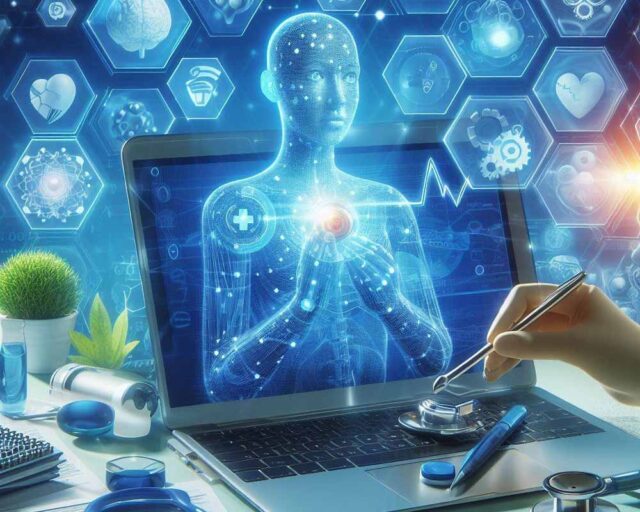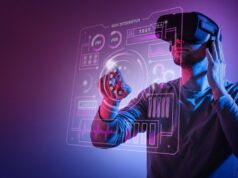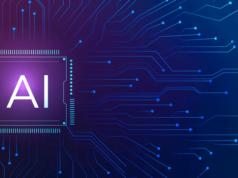AI in Healthcare: Revolutionizing Diagnosis and Patient Care
Artificial Intelligence (AI) has arisen as a unique advantage in the healthcare area, transforming how medical information is handled and healthcare administrations are given. The integration of AI-driven solutions has set off a critical shift, in accuracy enhancements as well as in the basic way to deal with delivering healthcare administrations. This article dives into the changed applications of AI, spanning from cutting-edge medical cycles to individualized treatment procedures. The accentuation is put on the significant role played by machine learning and the expected influence on the outcomes experienced by individuals.
AI Applications in Healthcare
Healthcare AI solutions consolidate a wide exhibit of utilizations that impact the power of man-made reasoning to smooth out cycles and work on everyday patient care. One of the fundamental commitments is in the space of conclusion. AI-driven determination utilizes complex calculations and AI to look at huge datasets, helping medical care experts in recognizing issues at a phenomenal level of exactness.
The Transformative Impact of AI on Diagnosis
The transformative impact of AI on diagnosis is clear in its capacity to quickly handle complex medical information. AI algorithms can break down a huge number of factors, including patient history, hereditary information, and imaging information, to recognize designs that might evade human perception. This speeds up the diagnostic interaction as well as improves its accuracy, leading to additional successful and opportune interventions.
Machine Learning in Patient Care
Machine learning assumes a critical part in patient care by enabling healthcare suppliers to tailor treatment plans in light of individual patient qualities. By continuously learning from new information, machine learning algorithms can foresee patient outcomes, suggest personalized treatment options, and even distinguish possible dangers before they manifest clinically. This proactive way to deal with patient care is revolutionizing the healthcare landscape, shifting the concentration from receptive to preventive medicine.
Advanced Medical Diagnostics with AI
AI is driving advancements in medical diagnostics, offering a degree of precision and productivity that was beforehand unimaginable. Imaging procedures, for example, X-ray and CT filters, benefit hugely from AI algorithms that can interpret pictures, identify irregularities, and give detailed insights to radiologists. This facilitates the diagnostic interaction as well as minimizes the gamble of oversight, at last improving patient outcomes.
Patient Care Innovation with Artificial Intelligence
AI’s impact on patient care stretches out a long way beyond diagnostics. Reshaping healthcare by introducing innovative technologies streamline administrative assignments, improve asset allocation, and upgrade communication between healthcare suppliers and patients. Virtual well-being partners, leveraging the force of AI, assume a vital part in facilitating remote monitoring, ensuring medication adherence, and delivering personalized well-being guidance. This integration of AI works on the effectiveness of healthcare operations as well as encourages a patient-driven approach, prioritizing personalized and proactive care conveyance.
Revolutionizing Healthcare through AI
The revolution in healthcare through AI is discrete by the integration of innovative technologies that expand the constraints of healthcare professionals. AI-powered diagnostics and treatment planning are becoming integral components of medical work, enhancing the proficiency and adequacy of healthcare conveyance. This transformation benefits patients as well as engages healthcare suppliers to settle on additional informed choices, finally leading to better patient outcomes.
Improving Patient Outcomes with AI
Improving patient outcomes stands as a key goal in integrating AI within healthcare. Through the utilization of broad information, AI algorithms succeed in recognizing designs, forecasting illness directions, and suggesting tailored treatment methodologies. This information-driven approach ensures the patient’s ideal and exact interventions, eventually elevating recuperation rates and enhancing by and large health.
Healthcare AI Algorithms
The focal point of AI in healthcare lies in its cutting-edge algorithms. These algorithms are intended to process and examine tremendous datasets, extracting meaningful insights that contribute to more exact diagnostics and treatment plans. As innovation continues to move, the refinement of these algorithms holds the best approach to unlocking additional open doors in healthcare, pushing the restrictions of what is attainable in patient care.
Future of Healthcare with Artificial Intelligence
The destiny of healthcare is clearly intertwined with artificial intelligence. As innovation continues to propel, the integration of AI is prepared to end up being fundamentally more inescapable. From judicious investigation to virtual well-being partners, the conceivable outcomes are immense. The future healthcare landscape will most likely see further advancements in precision medicine, where AI-enabled personalized healthcare transforms into the standard rather than the exception.
Precision Medicine and AI
Precision medicine, a methodology that considers individual changeability in qualities, environment, and way of life for every person, is essentially enhanced by AI. The integration of AI takes into account the examination of a huge scope of genomic and clinical information, facilitating the identification of designated treatments for explicit patient profiles. This collaboration between precision medicine and AI holds a colossal commitment to more successful and tailored healthcare interventions.
AI-Enabled Personalized Healthcare
With the assistance of AI, personalized healthcare is advancing to exceptional levels. Through the utilization of patient-express information, AI has the ability to propose tailored treatment plans, propose medication regimens, and recommend lifestyle interventions. This overhauls the sufficiency of treatments as well as diminishes the potential for negative reactions, fostering a procedure spun around the patient and recognizing the individual uniqueness of each and every person.
Role of Machine Learning in Medical Advancements
The role of AI in clinical headways could never be more critical. AI estimations can analyze massive datasets at mind-boggling paces, distinguishing unpretentious models and connections that could avoid customary consistent techniques. This limit is driving clinical assessment forward, speeding up the disclosure of novel treatments, and adding to a more significant comprehension of puzzling diseases.
Integrating AI into Healthcare Practices
The productive integration of AI into healthcare practices requires helpful exertion from healthcare professionals, subject matter experts, and innovation-trained professionals. Developing overwhelming AI algorithms, ensuring information security and protection, and fostering a culture of continuous learning are essential components of this integration. Through consistently incorporating AI into existing healthcare work processes, the industry can open the greatest limit of these technologies to help both healthcare providers and patients.
AI-Assisted Medical Decision-Making
Artificial intelligence helped clinical direction, which is a fundamental piece of the healthcare revolution. By providing healthcare professionals with information-driven insights, AI maintains clinical decision-making, helping to investigate the intricacies of current medicine. From choosing the best treatment to predicting likely complications, AI-assisted decision-making deals with the general thought of patient care.
Diagnostic Accuracy with Artificial Intelligence
The accuracy of conclusions is a central component of proficient healthcare, and AI is making significant advancements in this field. With the ability to quickly and definitively process broad datasets, AI algorithms lift diagnostic accuracy, diminishing the possibilities of misdiagnoses and ensuring that patients get the most reasonable and brief care.
Conclusion
In frame, the consolidation of AI into medical services is introducing a progressive period by lifting both finding and the opportunity of patient consideration. The verifiable impact of computerized reasoning is certain across different bits of medical care, going from AI-driven diagnostics to the detailing of customized therapy plans. As mechanical progressions drive forward, what’s to come holds the opportunity for extra advancements that stretch the constraints of what can be achieved in accuracy medication, patient-focused care, and clinical assessment. The course toward a future where AI expects a focal job in medical services is right now moving, introducing a thrilling and promising section for working on understanding results and reshaping the medical services scene








